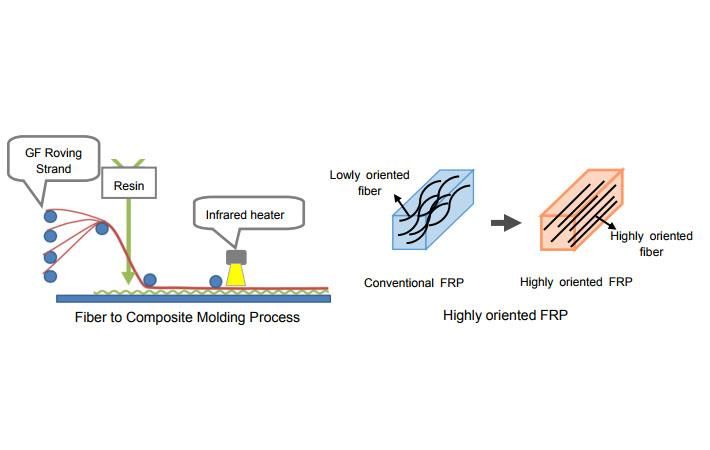ADEKA Corporation, the material manufacturer of chemical and food products, and GH Craft, the Teijin Group’s composite structure design, development and evaluation unit, have collaborated to develop first fibre-to-composite (FtoC) Molding Process to laminate fibre-reinforced plastics (FRP) in open molds. The method automates resin impregnating and curing.
ADEKA and GH Craft will unveil carbon-fibre reinforced plastic (CFRP) samples made with their new FtoC Molding Process at SAMPE Japan, an international trade fair showcasing the latest advances in materials and processing engineering, which will take place in Tokyo during November 29-December 1.ADEKA Corporation, the material manufacturer of chemical and food products, and GH Craft, the Teijin Group's composite structure design, development and evaluation unit, have collaborated to develop first fibre-to-composite (FtoC) Molding Process to laminate fibre-reinforced plastics (FRP) in open molds. The method automates resin impregnating and curing.#
The FtoC Molding Process automates resin impregnating, curing and laminating processes while aligning highly oriented fibres. A special new rapid-curing epoxy resin developed by ADEKA enables FRP to be cured in just tens of seconds with GH Craft’s new molding process using infrared radiation. Large-scale equipment such as curing ovens and press molds are not needed because the FRP can be laminated in an open mold. Also, compared to conventional composite production, the FtoC Molding Process considerably reduces fibre waste by directly molding fibres to the composite without requiring intermediate steps. Moreover, by extending and highly orienting fibres, the process produces glass-fibre-reinforced plastics (GFRP) that offers significantly improved performance, including 100 per cent more bending strength, 40 per cent more tensile strength and 75 per cent more interlayer shear strength compared to conventional GRFP made with conventional resin transfer molding (RTM).
Going forward, ADEKA will develop lineups of specialised resins for the FtoC Molding Process and GH Craft will develop practical applications. ADEKA and GH Craft will jointly verify the effectiveness of the FtoC Molding Process through the manufacture of practical products. Furthermore, the companies aim to jointly create a new composite market sector by working to establish the FtoC Molding Process as a de facto standard for FRP production.
FRP is made of aligned unidirectional fibre that is impregnated with matrix thermoset resin and then molded by heat. Conventional thermoset molding processes, such as autoclave and RTM, have drawbacks including long manufacturing cycles, high production costs, including for large equipment such as curing ovens and press molds needed for large-scale composites, and the need for intermediate trimming steps that produce large amounts of fibre waste. In addition, rather than highly orienting fibres, conventional thermoset molding processes twist the fibres in matrix resin, making it generally difficult to achieve high-tenacity FRP. (SV)
Fibre2Fashion News Desk – India


